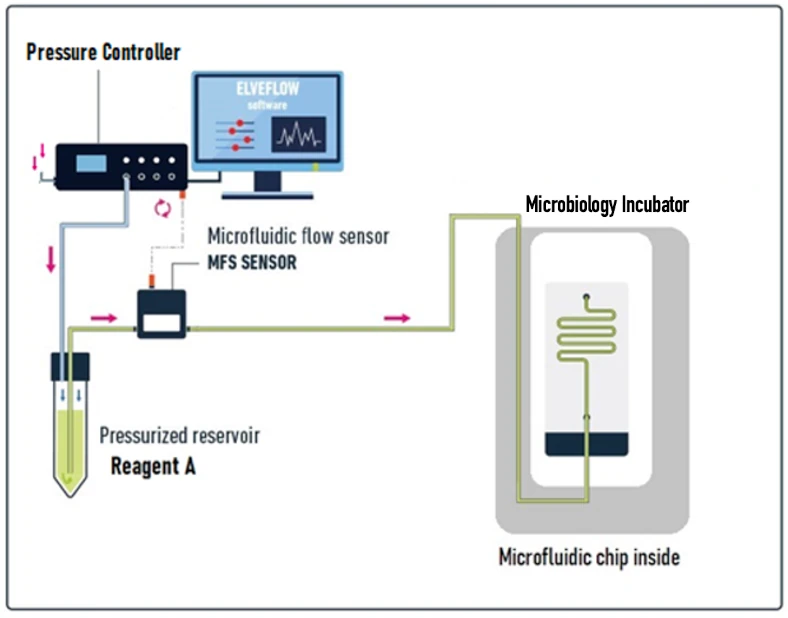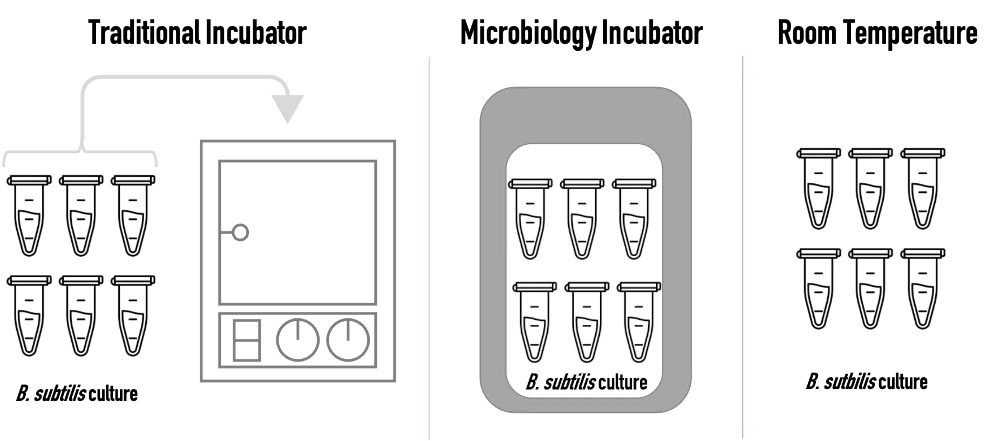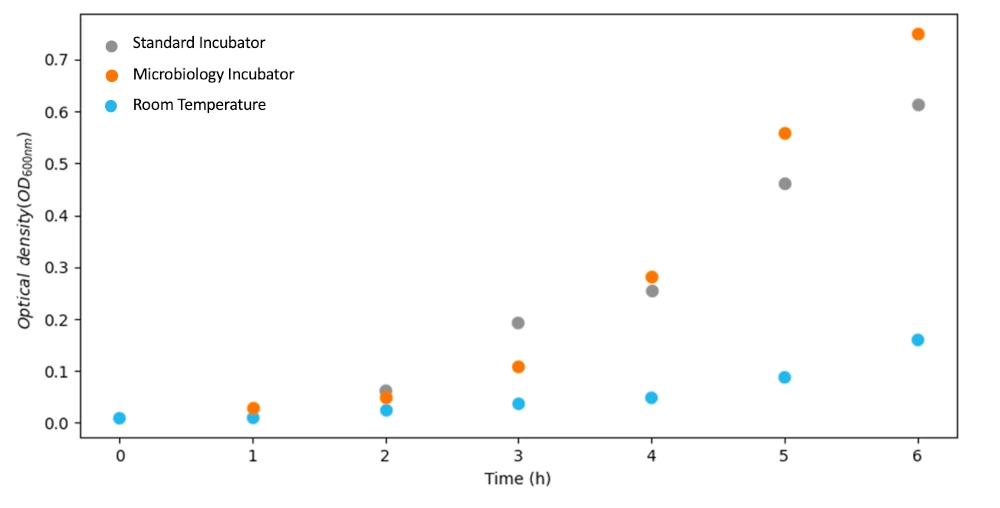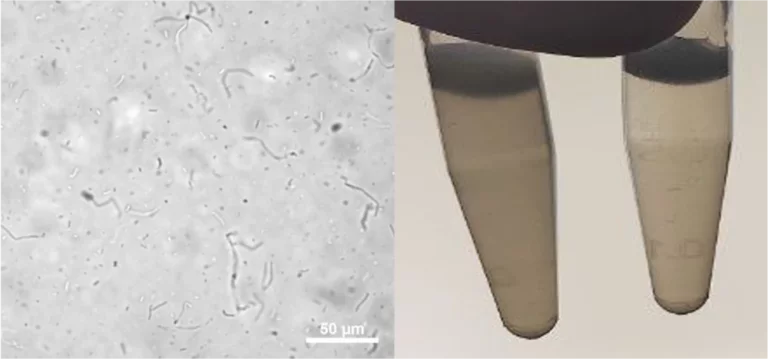Image credit: Proteus, SEM. David Gregory & Debbie Marshall.
MICROBIOLOGY INCUBATOR
Small and mobile incubator chamber for the microscope stage
Keep your bacteria at 37.5°C ± 0.5°C outside the incubator
Test different conditions in the same system
How to culture bacteria under the microscope?
The current advances in analytical assays allow greater detail and information out of experiments. For example, it is possible in microbiology to follow single-cell gene expression through time [1] or follow the growth rate and gene expression of several generations of bacteria [2] in microfluidic devices.
However, to do so also requires better ways of gathering data. For example, single-cell monitoring can be significantly improved if the bacterial culture is maintained on top of the microscope stage. But that, in turn, requires minimal culturing conditions outside the incubator.
The microbiology incubator was designed to address precisely this need. As shown below, it keeps an ideal temperature under the microscope for better imaging data gathering for either static or dynamic flow conditions.
References
1. Young, J., Locke, J., Altinok, A. et al. Measuring single-cell gene expression dynamics in bacteria using fluorescence time-lapse microscopy. Nat Protoc 7, 80–88 (2012). https://doi.org/10.1038/nprot.2011.432
2. Long, Z., Nugent, E., Javer, A., Cicuta, P., Sclavi, B., Lagomarsino, M. C., and Dorfman, K. D. Microfluidic chemostat for measuring single cell dynamics in bacteria. Lab Chip, 2013,13, 947-954
Microbiology incubator setup
The OB1 pressure-driven flow controller (Elveflow) and a specific flow sensor can control the flow in experiments with bacteria in dynamic conditions.
This setup can also be combined with other packs, such as media perfusion and recirculation, sequential injection, bubble trapping, cell-cell interaction monitoring, or fraction collection for more complex applications.

The Microbiology incubator pack contains:
- Microbiology incubator (in development)
- OB1 flow controller (Elveflow)
- Several Eppendorfor falcon reservoirs
- Tubings and luers
- Microfluidic chips if needed
- Flow sensors (options between MFS and the BFS, Elveflow)
- Control and automation software (Elveflow)
- User guide
For more information on the chamber, check our stage top incubator page!
The performance of the microbiology incubator
Bacillus subtilis is a gram-positive soil bacteria related to many critical applications in the food industry and environmental sciences. Given its wide range of utility and that it is not a pathogen to humans, it is a widespread model organism for bacterial adaptability, development, and biofilm formation.
It is found in diverse environments, from soil to human gut microbiome, with radical differences in temperature. In addition, they produce endospores that can withstand extreme temperatures. Therefore, depending on the behavior to be studied, high temperatures, constant fluctuations, or stable 37oC can be of interest as culturing conditions.
Here, the goal was to assess the performance of the microbiology incubator in comparison with a traditional incubator at 37oC and cultures grown at room temperature.
The microbiology incubator was initially designed to house dynamic cultures, such as cultures grown in chips subjected to media flow. However, it can easily accommodate static cultures and different culturing devices, such as the Eppendorf demonstrated below.
Methods
Freshly inoculated Lysogeny Broth (LB) medium was distributed in 18 Eppendorfs that were divided in three groups and placed in a standard incubator at 37 °C, in the microscope stage incubator at 37 °C and left outside at room temperature.

Results
Preliminary results of bacterial growth in the microbiology incubator show equivalent curves when compared to a standard incubator.

Each group’s turbidity of one Eppendorf was measured every hour for 6 hours with a spectrophotometer at 600 nm wavelength (OD600). OD600 measurements are routinely used to measure microbial proliferation in liquid cultures. Bacillus subtili’s ideal culture temperature is 37 °C.
Therefore, faster growth is expected in inoculates stabilized at such temperatures. Both incubator and microbiology incubator showed similar OD readings at each timestep, with both groups entering the exponential growth phase as opposed to the room temperature group.

Customize your microbiology incubator pack
In the past years, several commercialized and laboratory-made microfluidic chips have been developed and tested to perform dynamic cell and bacteria culture efficiently. We can include one of them with different surface modifications inside the pack. A chip can also have several separate channels.
Our products and packs are fully customizable to fit your needs. Our microfluidic specialists and researchers will help you choose the best instruments and accessories and accompany you during the setup of the microfluidic platform until you can obtain your first experimental results.
Contact our experts for any questions about this microbiology incubator and how it can match your specifications!
– Check our other Packs for various applications –
Is the microbiology incubator gas-tight
No, the chamber allows gas exchange with the atmosphere.
Can the chamber be sterilized?
Yes, we have developed a simple protocol for sterilization and cleaning that is provided along with the user guide.
In the case of dynamic culture, do the reservoirs need to be kept warm?
No, the reservoirs can be kept at room temperature. The microbiology incubator was designed to warm the liquids to the right temperature before reaching the bacteria.
Can I order a pack?
Packs like this one are available under certain conditions. Since Packs are still under development, we have a few eligibility criteria to maximize their success rate. Discussions with our experts are needed to determine your specific needs and offer you a personalized response. Drop us a line at: innovation@microfluidic.fr.
Funding and Support
The ActiveMatter and ACDC, projects results helped develop this instrument pack, with funding from the European Union’s Horizon 2020 MSCA-ITN under grant agreement No 812780 (Active Matter) and the European Union’s Horizon 2020 research and innovation program under grant agreement No 824060 (ACDC project).
![]()
![]()

![]()